Combinata nordica
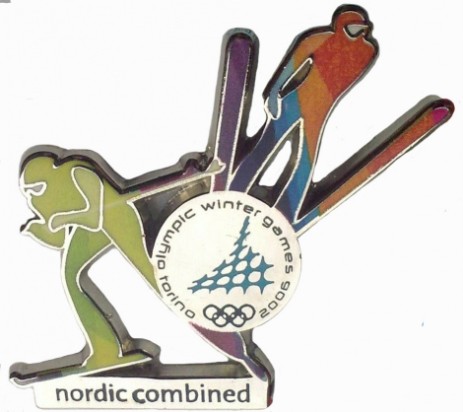

Nella combinata nordica ai XX Giochi olimpici invernali furono disputate tre gare, riservate agli atleti di sesso maschile: la sprint, l'individuale e la gara a squadre. Rispetto all'edizione precedente fu introdotta una variazione nel programma: la prima prova della gara a squadre si disputò dal trampolino lungo anziché dal trampolino normale. Presero il via 48 atleti e la prima prova disputata, il 21 febbraio, fu quella di salto. Sul trampolino K125 dello Stadio del Trampolino dalle ore 11:52 si effettuò un solo salto, con valutazione della distanza e dello stile. S'impose il tedesco Georg Hettich davanti al francese Jason Lamy-Chappuis e al finlandese Anssi Koivuranta; dodicesimo e tredicesimo furono l'austriaco Felix Gottwald e il norvegese Magnus Moan. Lo stesso giorno, dalle ore 15:00, si corse la 7,5 km di sci di fondo nella formula a inseguimento a tecnica libera, sul percorso di Pragelato Plan con un dislivello massimo di 59 m; Gottwald e Moan, autori dei primi due migliori tempi, riuscirono a risalire fino all'oro e all'argento superando Hettich, che non andò oltre il ventiseiesimo tempo.
COMBINATA NORDICA: UN UOMO FELICE
Gli amici lo chiamano Felitsche, sembra "felice" in italiano e del resto proprio i Giochi disputati in Italia gli hanno regalato la gioia più grande: l'austriaco Felix Gottwald, già sul podio a Salt Lake 2002, domina il panorama della combinata nordica con un oro e un argento individuali, oltre al successo in staffetta. Colleziona un balzo da 112 metri e il miglior tempo nel fondo. Ma le gare di Pragelato si ricorderanno anche per lo splendido sprint del tedesco Georg Hettich nella 15 km individuale inseguimento - proprio su Gottwald - e per la sconfitta del favorito finlandese Hannu Manninen. (dal rapporto ufficiale del C.O.)
Felix by name and now Felix (happy) by nature, thanks to the Torino 2006 Games. Austrian Felix Gottwald, who had already made it to the podium at Salt Lake 2002, dominated the nordic combined by taking individual gold and silver, in addition to a gold in the relay. He also achieved a 112 m jump and the fastest cross-country skiing time. But Pragelato will also be remembered for German Georg Hettich's blisteringly fast sprint in the 15 km individual pursuit and for the defeat of the favourite Hannu Manninen of Finland.
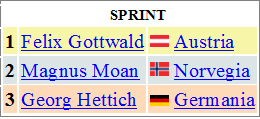
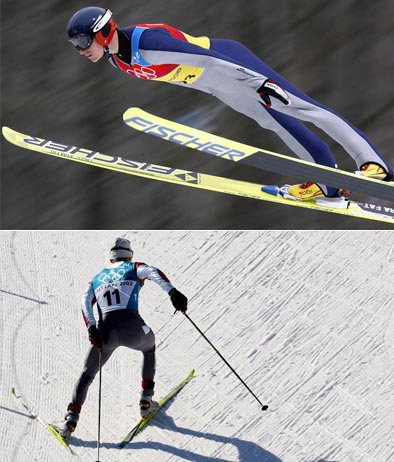
Nella gara individuale presero il via 50 atleti e la prima prova, disputata, l'11 febbraio, fu quella di salto. Sul trampolino K95 dello Stadio del Trampolino dalle ore 11:00 si effettuarono due salti, con valutazione della distanza e dello stile. S'impose il tedesco Georg Hettich davanti al norvegese Petter Tande e - terzi a pari merito - al francese Jason Lamy-Chappuis e al finlandese Jaakko Tallus; nono e undicesimo furono l'altro norvegese Magnus Moan e l'austriaco Felix Gottwald. Lo stesso giorno, dalle ore 15:00, si corse la 15 km di sci di fondo a tecnica libera, sul percorso di Pragelato Plan con un dislivello massimo di 69 m; il tedesco Sebastian Haseney, autore del miglior tempo, non riuscì a colmare lo svantaggio accumulato nella prima prova, mentre Gottwald e Moan, rispettivamente secondo e terzo, riuscirono a risalire fino all'argento e al bronzo. Hettich, diciottesimo, confermò l'oro.
In the individual competition, 50 athletes took part and the first event, held on February 11, was the jump. On the K95 springboard at the Trampoline Stadium from 11:00 onwards, two jumps were held, with evaluation of distance and style. The German Georg Hettich won ahead of the Norwegian Petter Tande and - in third place - the French Jason Lamy-Chappuis and the Finnish Jaakko Tallus; ninth and eleventh were the other Norwegian Magnus Moan and the Austrian Felix Gottwald. On the same day, from 3:00 p.m. onwards, the 15 km of free technique cross-country skiing was run on the Pragelato Plan course with a maximum difference in altitude of 69 m; the German Sebastian Haseney, author of the best time, was unable to make up for the disadvantage accumulated in the first trial, while Gottwald and Moan, second and third respectively, were able to climb up to silver and bronze. Hettich, eighteenth, confirmed the gold.
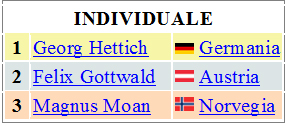
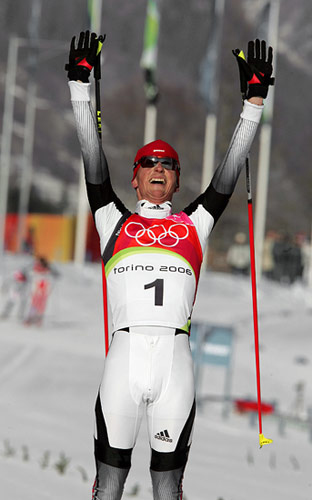
The german Georg Hettich winner in the individual
Nella gara a squadre presero il via 10 squadre nazionali e la prima prova disputata, il 15 febbraio, fu quella di salto. La gara, in programma nella sola giornata del 15, venne sospesa dalla giuria dopo il primo turno di salti per avverse condizioni atmosferiche: il secondo salto e la staffetta 4 x 5 km vennero posticipati al 16 febbraio. Sul trampolino K125 dello Stadio del Trampolino dalle ore 10:30 s'impose la Germania davanti all'Austria, alla Russia e alla Finlandia. Il 16, dalle ore 15:00, si corse la staffetta 4x5 km di sci di fondo a tecnica libera, sul percorso di Pragelato Plan con un dislivello massimo di 59 m; l'Austria marcò il miglior tempo e ottenne l'oro, mentre la Finlandia, seconda, risalì fino al bronzo. Terza fu la Svizzera, che non riuscì a colmare il divario accumulato nella prima prova chiudendo quarta, mentre la Germania con il quarto tempo scalò in seconda posizione. L'Italia non concluse la gara.
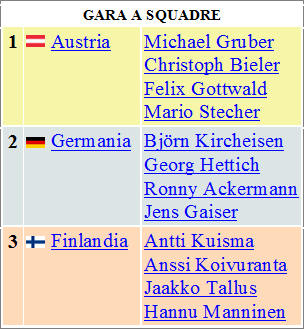
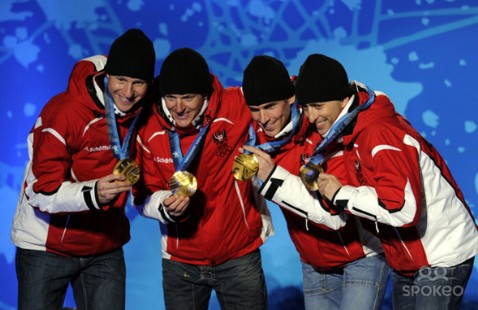
Austrian team catch the gold medalAustria take the gold in the Nordic Combined event at Torino 2006.